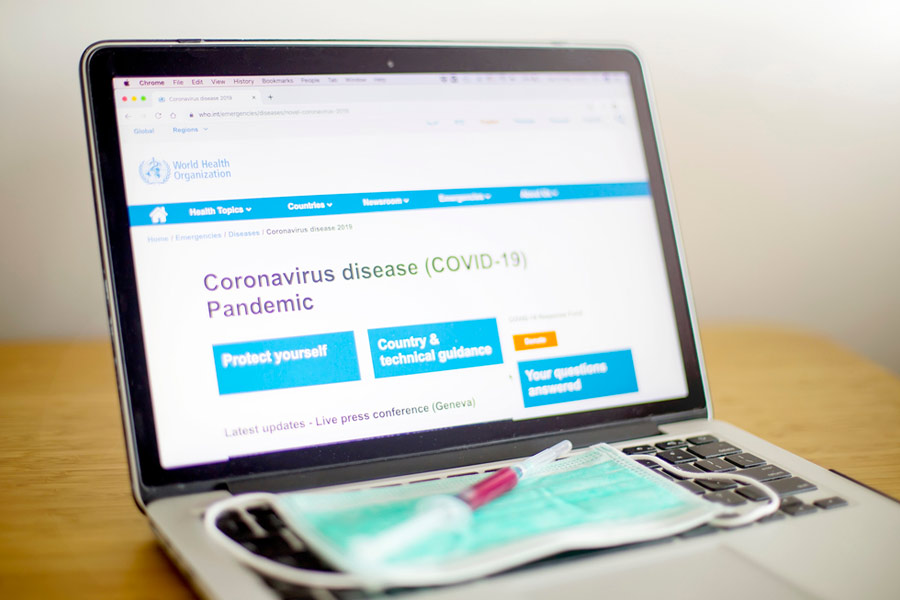The World Health Organisation has classified COVID-19 strain JN.1 as a separate "variant of interest" given its rapidly increasing spread but said that it poses a "low" global public health risk.
The JN.1 variant was previously classified as a variant of interest (VOI) as part of the BA.2.86 sublineages, the parent lineage that is classified as a VOI, the world body said on Tuesday.
However, in recent weeks, JN.1 continues to be reported in multiple countries, and its prevalence has rapidly increased globally. India has also reported its first case of the JN.1 variant.
It now represents the vast majority of BA.2.86 descendent lineages reported to the Global Initiative on Sharing All Influenza Data (GISAID), according to the World Health Organisation (WHO).
"Due to its rapidly increasing spread, WHO is classifying JN.1 as a separate variant of interest (VOI) from the parent lineage BA.2.86," the global health body said in a post on X.
The WHO evaluated the additional global public health risk posed by JN.1 as "low, based on the available yet limited evidence," but warned, "It is anticipated that this variant may cause an increase in SARS-CoV-2 cases amid a surge of infections of other viral and bacterial infections, especially in countries entering the winter season." The JN.1 variant has been reported in the USA, China, Singapore and India, according to India's Ministry of Health and Family Welfare. Seven cases of the variant have been reported from China.
The strain has caused an uptick of cases in various countries, including Singapore, which reported a 75 per cent jump with 56,043 cases last week, according to its Ministry of Health (MOH).
The vast majority of the growing cases in the city-state are infected by the JN.1 variant, the ministry said.
The first JN.1 case in India was detected in a sample taken from a 79-year-old woman in Kerala with mild symptoms on December 8.
Earlier, a traveller from Tamil Nadu's Tiruchirapalli district was found to be infected with the JN.1 variant in Singapore.
Union Health Minister Mansukh Mandaviya on Wednesday reviewed the preparedness of health facilities and impressed upon the states to be alert and increase surveillance.
Assuring the states of receiving all support from the Centre, he said, "We need to be on the alert but there is no need to panic." In a letter to states and union territories, Union Health Secretary Sudhansh Pant on Monday urged states to ensure effective compliance with the detailed operational guidelines for a revised surveillance strategy for COVID-19, as has been shared by the Union Ministry of Health and Family Welfare.
They were also advised to ensure adequate testing in all districts per COVID-19 testing guidelines and maintain the recommended share of RT-PCR and antigen tests.
Pant also attached details about the variant in an annexure, which stated that JN.1 (BA.2.86.1.1) emerged in late 2023 and is a descendant of the BA.2.86 lineage (Pirola) of SARS-CoV2.
BA.2.86 carries more than 30 mutations in the spike (5) protein, indicating a high potential for immune evasion.
The annexure stated that it is not currently known whether the JN.1 infection produces symptoms different from other variants.
In general, symptoms of COVID-19 tend to be similar across variants, and there is also no indication of increased severity from JN.1.
The existing treatment line for COVID-19 is expected to be effective against JN.1 infection, and updated vaccines are expected to increase protection against the variant, it said.
In late 2020, the emergence of variants that posed an increased risk to global public health prompted WHO to characterise some as VOIs and variants of concern (VOCs) to prioritise global monitoring and research and to inform and adjust the COVID-19 response.
Except for the headline, this story has not been edited by The Telegraph Online staff and has been published from a syndicated feed.











